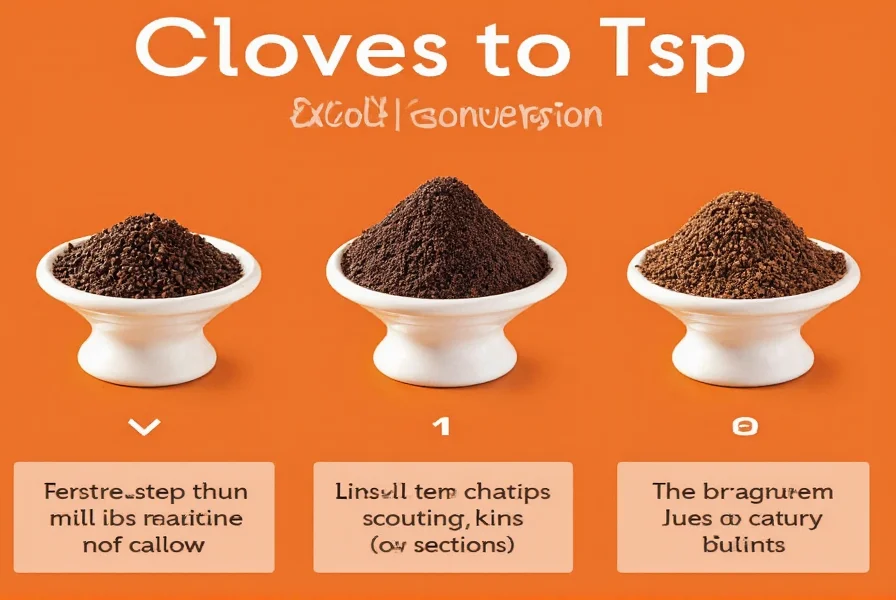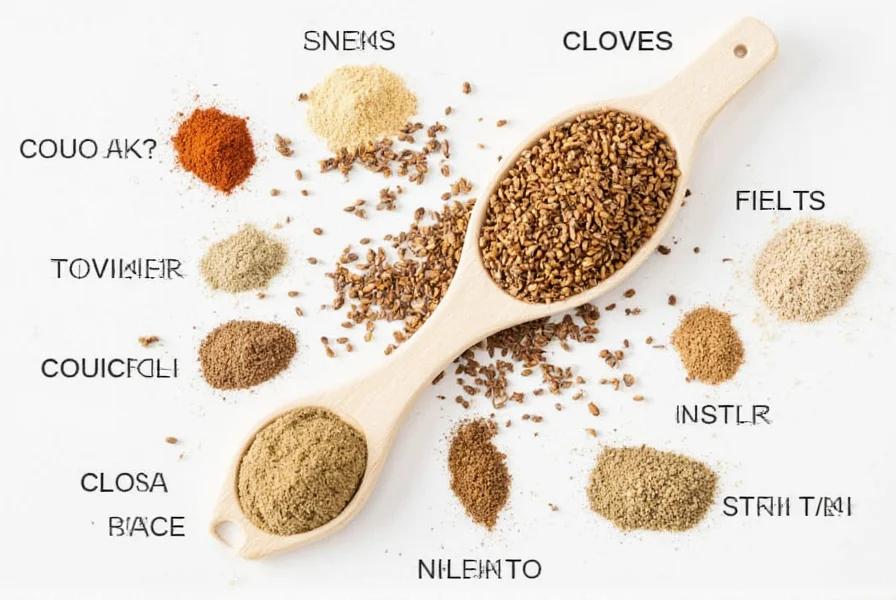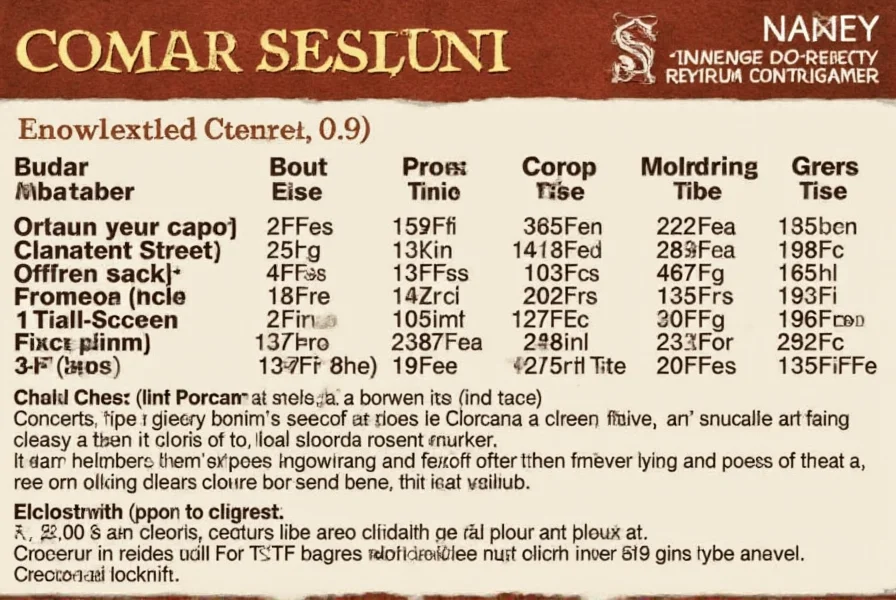One whole clove equals approximately 1/4 teaspoon of ground cloves. This standard culinary conversion is essential for accurate recipe execution when substituting between whole and ground cloves in cooking and baking applications.
Understanding spice measurements can make or break your culinary creations. When recipes call for cloves but you only have either whole or ground form available, knowing the precise cloves to tsp conversion becomes crucial for maintaining the intended flavor profile. This guide provides accurate measurement equivalents and practical substitution advice for home cooks and baking enthusiasts.
Understanding Clove Measurements
Cloves, whether whole or ground, deliver potent flavor that can easily overwhelm a dish if measured incorrectly. The conversion ratio between whole cloves and ground cloves isn't always straightforward due to variations in clove size and grinding consistency.
| Whole Cloves | Ground Cloves (Teaspoons) | Ground Cloves (Tablespoons) |
|---|---|---|
| 1 clove | ¼ tsp | - |
| 4 cloves | 1 tsp | ⅓ tbsp |
| 12 cloves | 3 tsp | 1 tbsp |
| 24 cloves | 6 tsp | 2 tbsp |
Factors Affecting Clove Measurements
Several variables influence the whole cloves to ground cloves conversion accuracy:
- Clove size: Larger Indonesian cloves yield more ground spice than smaller Madagascar varieties
- Grinding method: Mortar and pestle versus spice grinder produces different densities
- Freshness: Older cloves lose potency, requiring slightly more for equivalent flavor
- Packing: How tightly ground cloves are packed into measuring spoons
For the most accurate cloves measurement substitution, consider freshly grinding whole cloves when precision matters most in delicate recipes.

Practical Application in Cooking
Knowing when to use whole versus ground cloves significantly impacts your dishes:
When to Use Whole Cloves
- Simmering in liquids (mulled wine, broths, poaching liquids)
- Studding hams or onions for slow cooking
- Recipes where you'll remove spices before serving
- Situations requiring visual presentation with whole spices
When Ground Cloves Work Best
- Baking applications (gingerbread, spice cakes)
- Dry rubs and spice blends
- Quick-cooking dishes where infusion time is limited
- Recipes requiring uniform spice distribution
The flavor intensity differs between forms—ground cloves deliver more immediate, sharper flavor while whole cloves provide gradual infusion. This cloves to tsp conversion guide helps maintain consistent results regardless of which form you use.
Storage Considerations for Optimal Flavor
Proper storage affects your cloves measurement substitution accuracy over time:
- Whole cloves retain potency for 1-2 years when stored in airtight containers away from light
- Ground cloves lose flavor within 6 months, requiring slightly more for equivalent taste
- Freezing extends shelf life but may affect measurement density due to moisture

Common Measurement Mistakes to Avoid
Many home cooks make these errors with cloves to teaspoon conversion:
- Using volume measurements for whole cloves instead of counting individual pieces
- Not adjusting for clove size variations between spice brands
- Substituting ground cloves 1:1 for whole cloves (it should be 1:¼ tsp)
- Using old ground cloves without compensating for diminished potency
For critical recipes, consider weighing cloves instead of using volume measurements. One whole clove weighs approximately 0.2 grams, while ground cloves have a density of about 0.6 grams per ¼ teaspoon.
Recipe Substitution Guidance
When adapting recipes that specify one form of cloves but you only have the other:
- For baking: Use ¼ tsp ground cloves per whole clove called for, but reduce by 10% if cloves are freshly ground
- For simmering liquids: Substitute 1 whole clove with ⅛ tsp ground cloves (the prolonged cooking extracts more flavor from whole cloves)
- When making spice blends: Use ⅓ less ground cloves than the whole clove equivalent to prevent overpowering
Remember that teaspoon equivalent for whole cloves varies slightly based on your specific application. Always taste and adjust as you cook for best results.
Frequently Asked Questions
How many teaspoons is one clove of cloves?
One whole clove equals approximately 1/4 teaspoon of ground cloves. This standard conversion applies to most cooking and baking applications, though slight variations may occur based on clove size and freshness.
Can I substitute ground cloves for whole cloves in recipes?
Yes, you can substitute ground cloves for whole cloves using a 1:¼ teaspoon ratio (one whole clove equals ¼ teaspoon ground cloves). For simmering applications, use slightly less ground cloves (⅛ teaspoon) as whole cloves release flavor more gradually during cooking.
Why does my recipe taste too strong when I substitute ground cloves?
Ground cloves deliver more immediate and intense flavor than whole cloves. If your dish tastes too strong, you've likely used too much ground cloves. Remember that 1 whole clove equals only ¼ teaspoon of ground cloves, not a full teaspoon. Always start with less and adjust to taste.
Do older cloves require different measurements?
Yes, older cloves lose potency over time. Ground cloves typically maintain peak flavor for 6 months, while whole cloves last 1-2 years. If using older cloves, you may need to increase the amount by 10-20% to achieve the same flavor intensity as fresh cloves. For critical recipes, consider replacing old spice stocks for more accurate measurements.
Is there a weight-based conversion for cloves to tsp?
Yes, for greater precision: one whole clove weighs approximately 0.2 grams, while ground cloves have a density of about 0.6 grams per ¼ teaspoon. Using a kitchen scale provides more consistent results than volume measurements, especially for baking where precision matters most.











 浙公网安备
33010002000092号
浙公网安备
33010002000092号 浙B2-20120091-4
浙B2-20120091-4